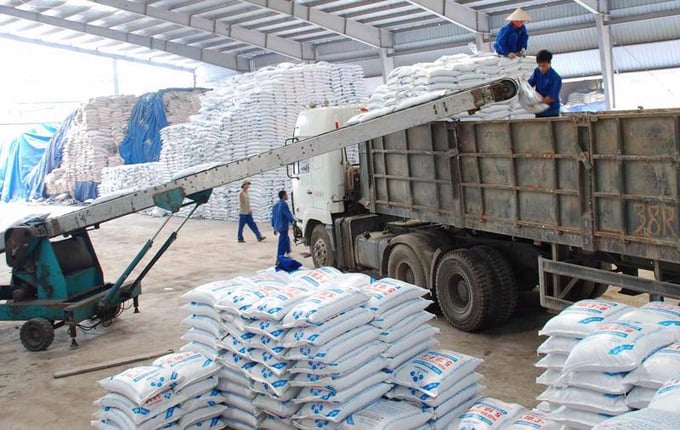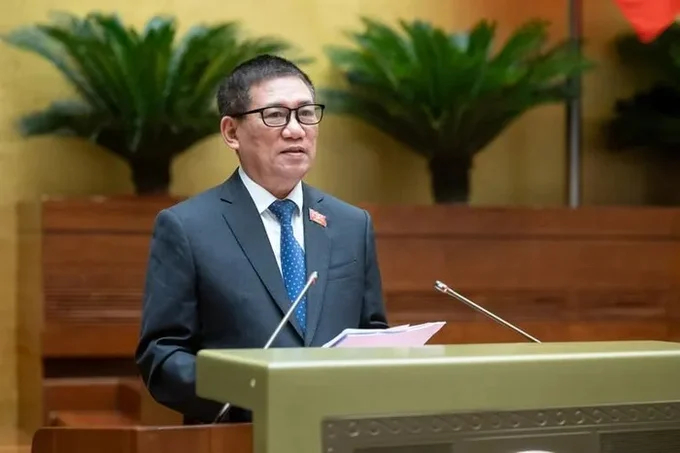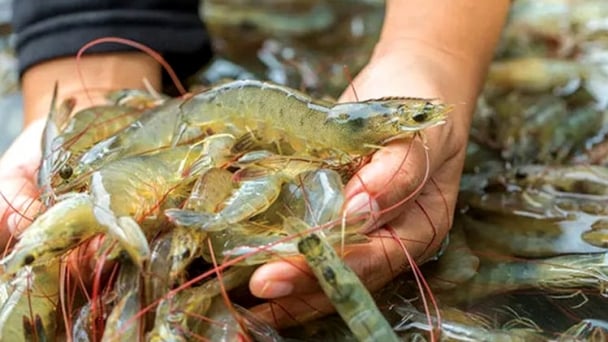May 23, 2025 | 19:26 GMT +7
May 23, 2025 | 19:26 GMT +7
Hotline: 0913.378.918
May 23, 2025 | 19:26 GMT +7
Hotline: 0913.378.918

Fertilizers are categorized under goods subject to a 5% VAT rate. Photo: Illustration.
On the afternoon of June 17th, the National Assembly heard reports from the government and inspection agencies regarding the draft amendment to the Value Added Tax Law.
In the Proposal for the Law project, Minister of Finance Ho Duc Phoc clearly stated that after 15 years of implementation, the Value Added Tax (VAT) Law of 2008 has achieved significant results. However, during the process of economic, social, and international economic integration development, this law has also revealed certain limitations and existing issues.
One prominent issue addressed in the proposal is the excessive number of goods and services exempted from VAT (26 groups), which increases production costs for businesses due to the inability to deduct input VAT. This situation affects enterprises across the supply chain.
The current VAT Law applies three tax rates: 0%, 5%, and 10%. However, the application of these rates to various categories of goods is deemed inappropriate. There are still many categories subject to the 5% tax rate (14 goods and services categories), which does not fully align with the reform direction of establishing a unified tax rate.
Determining tax rates based on the intended use of certain goods also presents challenges for both tax authorities and taxpayers.
Minister Ho Duc Phoc mentioned that the draft amendment to the VAT Law consists of 4 chapters and 18 articles, largely inheriting provisions from the current law but with adjustments and supplements to better fit policy objectives.
To streamline the list of tax-exempt items and ensure transparency, clarity, ease of implementation, and consistency with specialized legal frameworks, the Government proposed renaming certain goods and services categories to synchronize with sector-specific regulations. This includes revising provisions for certain goods and services to harmonize with sector-specific laws, thus avoiding implementation issues.
Notably, the provision stating "Goods and services of households or individuals engaged in business with annual revenue of less than VND 100 million" has been amended to "Goods and services of households or individuals engaged in business with annual revenue below the level stipulated by the Government" to ensure flexibility and proactive adjustment to suit practical circumstances.
Furthermore, the Government proposed moving certain goods and services categories to the VAT-taxable category to align with international practices and mitigate cost increases and complexity for businesses. Examples include fertilizers; fishing vessels operating in offshore and sea areas; specialized machinery and equipment for agricultural production; and essential postal, telecommunication, and internet services.
Additionally, the draft law proposes adding certain goods and services categories to the tax-exempt category to align with emerging practical needs. Examples include loans contracted by the Vietnamese Government from foreign lenders; imported goods supporting disaster relief, epidemic control, and war efforts under Government regulations; and cultural relics imported by state agencies authorized under cultural heritage laws.

Minister of Finance Ho Duc Phoc presented the Proposal for the amended Value Added Tax Law.
With the proposed amendments and additions mentioned above, the draft Law retains the existing 26 categories of goods and services exempt from VAT but has narrowed down the items within these 26 exempt categories.
Specifically, the draft Law removes 12 types of goods and services from the list of VAT-exempt items, including fertilizers; specialized machinery and equipment for agricultural production; offshore fishing vessels; securities depository; market organization services by stock exchanges or securities trading centres; public postal services; public telecommunications services; universal Internet access services under the Government's program; zoo maintenance services; botanical garden and park maintenance services; street tree maintenance services; and public lighting services.
Among these changes, fertilizers are placed into the category of goods subject to a 5% VAT rate. This adjustment aims to ensure fairness and rationality within the tax system while alleviating burdens on manufacturing enterprises.
The draft amendment to the VAT Law promises to bring about positive reforms, contributing to enhanced transparency, efficiency, and fairness in Vietnam's tax system.
Translated by Hoang Duy

(VAN) WWF, GIZ, IUCN, UNDP call for biodiversity conservation and sustainable development must be regarded as a unity in strategies for a green future.

(VAN) On celebration of International Day for Biological Diversity, Deputy Minister Nguyen Quoc Tri called for practical actions to address nature and biodiversity conservation.

(VAN) Dr. Hoang Thi Thanh Nhan – Deputy Director of the Nature and Biodiversity Conservation Agency – highlighted this on the International Day for Biological Diversity, May 22, 2025.
![Ho Chi Minh city adapts to climate change: [2] Accelerating action](https://t.ex-cdn.com/nongnghiepmoitruong.vn/608w/files/chiqk/2025/05/22/4024-4220-bien-doi-khi-hau-1-100626_766.jpg)
(VAN) Clearly recognizing the challenges posed by climate change, Ho Chi Minh city has swiftly shaped its policies and implemented practical solutions to adapt.

(VAN) Rice straw is no longer just a discarded byproduct, but it is becoming a green resource that helps farmers in the Mekong Delta reduce emissions and promote circular, sustainable agriculture.

(VAN) Other Effective Area-based Conservation Measures (OECMs) are solutions that contribute effectively to achieving the goals of the Kunming–Montreal Global Biodiversity Framework.

(VAN) A study assessing the carbon footprint of whiteleg shrimp farming in China shows the potential for carbon emission reduction through the use of renewable energy.